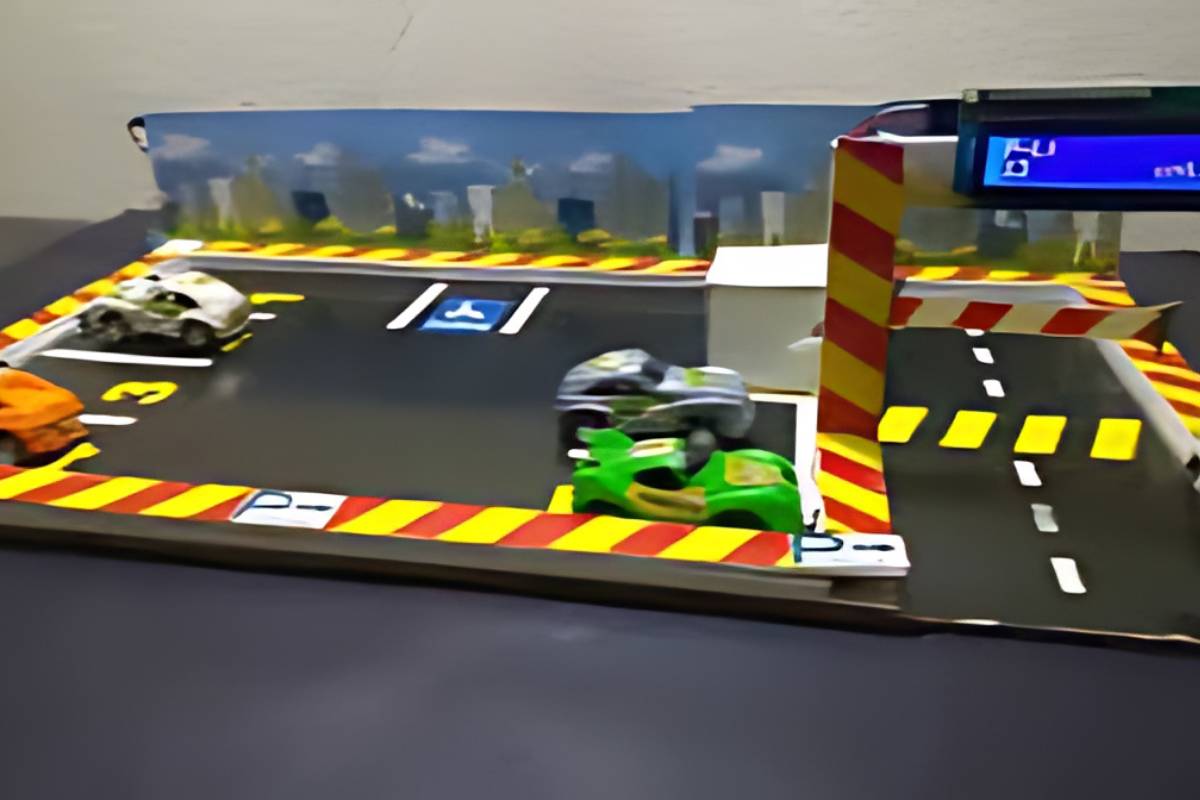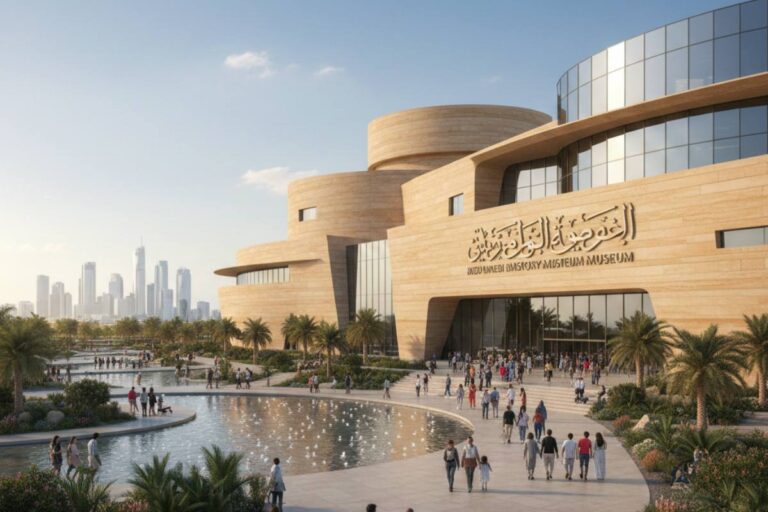The Falaj Hazza schools zone in Al Ain has set up a fully paid parking system that adds 4,671 regulated parking spaces to help with the growing traffic and safety issues around schools.
A New Way to Manage Traffic
The smart infrastructure company Q Mobility started this big project on September 22, 2025. It will focus on three main areas in the Schools’ Zone in Falaj Hazza. The implementation is a big change in how school traffic is handled across the emirate… and to be honest, it’s about time.
The system fixes what parents and teachers have been complaining about for a long time:
- Parking lots that are always a mess
- Dangerous conditions for students
- Huge traffic jams during pickup and drop-off times
Random parking has been a constant problem, with cars blocking views and making it hard to see near school entrances, which is dangerous.
Full Coverage in Important Areas
The paid parking zones now cover important areas in the school district, making sure that they are available where they are needed most. These aren’t just random parking spots all over the place. They’ve been carefully planned to:
- Keep traffic moving smoothly
- Keep students safe while they walk
Q Mobility’s method combines cutting-edge technology with smart city planning. They use AI and IoT solutions to build what they call “future-ready urban infrastructure.” The company’s goal is not just to manage parking; it’s to rethink how school zones work in modern cities.
Combining Smart Technology
The parking system uses the latest technology to keep track of available spaces in real time, making it easier for parents to find parking spots. This cuts down on the time cars spend driving around school zones, which is one of the main reasons traffic gets so bad during rush hour.
The project is part of Abu Dhabi’s larger smart city vision, which says that technology should make life easier and safer, not harder. These changes could make a big difference for parents who are in a hurry to drop off their kids before work. They could make the morning less stressful and the day go more smoothly.
Traffic Safety is Now the Most Important Thing
School zones in the UAE are getting more and more dangerous, and random parking is putting students in real danger. The new system directly addresses these issues by making sure that cars only park in designated areas, which keeps sightlines clear for both drivers and pedestrians.
Abu Dhabi Police have been very clear about how dangerous it is to park in the wrong place near schools. They say that this makes traffic flow worse and puts kids at risk during pickup times in the afternoon. The fines for parking randomly have also gone up, and people who stop in the middle of the road without a good reason can now be fined up to Dh1,000.
Better Ways to Protect Students
The regulated parking system makes the paths that students take to and from school safer. The zones now have:
- Better visibility for crossing areas
- Less likely to cause accidents involving pedestrians
- No random parking allowed
These changes have also made a big difference in how school buses run. Before, cars parked illegally would block bus routes, which would cause delays and make buses have to go around things. The new system makes sure that certain areas stay clear for school buses.
Mawaqif System Growth Plan
This Al Ain implementation is part of a bigger plan to expand the Mawaqif parking system throughout the emirate of Abu Dhabi. The first phase of Mawaqif in Al Ain, which included five sectors and more than 5,600 parking bays, was already put into place in early 2025.
The charging structure is the same as the standard Mawaqif model:
- Dh2 per hour for standard bays marked in turquoise and black
- Dh15 for parking all day
- Dh3 per hour for turquoise and white premium bays (maximum of four hours)
Hours of Operation and Exceptions
The paid parking is open from 8 a.m. to midnight, Saturday through Thursday, according to the Mawaqif schedule. Families going to school events or activities on the weekends can still park for free on Sundays and public holidays.
Residents can get parking permits from Mawaqif Customer Service Centers. With these permits, they can park in standard bays without paying extra. This arrangement makes sure that people who live near school zones don’t have to pay extra.
Wider Abu Dhabi School Safety Program
The Al Ain parking plan fits in with Abu Dhabi’s overall plan for keeping school zones safe. The Integrated Transport Centre (ITC) has looked closely at more than 60 schools in the emirate and made plans for each one to improve its transportation system.
These studies included:
- Visits to the schools
- Surveys
- Direct conversations with school leaders and staff to learn about the specific problems at each school
Some schools had too many students, while others had problems with not enough bus parking or unsafe places for people to cross the street.
Improvements to Infrastructure Other Than Parking
The larger project includes many improvements to the infrastructure, such as:
- More parking spaces for buses and cars
- New traffic patterns
- Better facilities for people to cross the street
To stop traffic jams during busy times, the paths in and out of schools have been changed.
These changes show that school zone management should take a whole-system approach, since parking is only one part of a complicated transportation system. The fact that different groups, like the Abu Dhabi Police, city officials, and transportation planners, work together shows that the emirate cares about the safety of its students.
The Community’s Reaction and Adaptation
Most parents and school officials are in favor of the changes, but it will take some time to get used to them. The system makes things safer and easier for families, even if they have to pay for parking spots that used to be free.
The implementation has also made things better for teachers and school staff, who used to have trouble finding parking spaces during work hours. With set spaces and clear time limits, the turnover rate has gone up, making sure that there is always availability during the day.
Programs for Educational Outreach
Q Mobility and local governments have started campaigns to raise awareness about the new system among parents. These programs go over:
- How to pay
- How long can you park
- How important it is to stay in the right areas for safety reasons
The educational part is very important because it needs the help and understanding of the community to work well. When parents understand how the system makes their kids safer, the rates of compliance usually go up a lot.
Advantages for the Environment and the Economy
The paid parking system not only makes things safer, but it also generates revenue that can be used to fund further improvements to the infrastructure. The money that the Mawaqif system collects usually goes toward ongoing maintenance and expansion of parking facilities all over Abu Dhabi.
The organized parking method also reduces pollution by decreasing the time cars spend searching for parking spots. When parents can quickly find open spots, Abu Dhabi’s environmental goals are met because less fuel is used overall.
Long-term Planning for Cities
Abu Dhabi’s long-term urban development plan includes the Al Ain school parking project. As the emirate keeps growing, smart traffic management is necessary to keep residential areas safe and livable.
The smart parking system collects data that is useful for making decisions about plans. Decisions about where to put more infrastructure money are based on:
- Traffic patterns
- Peak usage times
- Space utilization rates
The System’s Technology
Q Mobility uses advanced monitoring technology to keep track of space availability and make sure operations run smoothly. The system can give parents real-time updates on parking availability, which helps them plan when to arrive better.
The system can learn from how people use it and improve space allocation over time, thanks to the use of artificial intelligence. As the system collects more operational data, it becomes more efficient thanks to this adaptive approach.
Ways to Pay and Enforce
There are many ways to pay for parking, such as:
- Sending an SMS to 3009
- Using a mobile app
- A physical payment machine
- A rechargeable card
This flexibility lets parents pick the payment method that works best for them.
Enforcement includes:
- Regular parking attendants
- AI-powered surveillance systems that can find violations on their own
The 10-minute grace period gives parents some leeway if they are running a little late, but it still keeps the system in order.
Background and Examples from the Region
Al Ain’s implementation follows successful parking management programs in Abu Dhabi city and other parts of the emirate. The slow growth of paid parking zones shows that traffic management is being done in a way that balances making money with serving the public.
Other UAE cities have tried similar school zone parking programs, and they have worked well to make the roads safer and improve traffic flow. The Al Ain project benefits from these experiences by using what was learned from earlier projects.
A Comparison with the Best Practices Around the World
The way the school zone parking is managed is in line with best practices used in developed cities all over the world. Many cities have found that regulated parking near schools:
- Makes things much safer for students
- Cuts down on traffic jams
Abu Dhabi is one of the world’s leaders in smart city initiatives because of its focus on technology integration. This shows how emerging economies can use technology strategically to get ahead of traditional infrastructure methods.
Plans for Growth in the Future
Q Mobility has said that this implementation is part of a plan to expand that will improve traffic flow and safety in many places. If the Al Ain pilot is successful, similar systems may be put in place in more school zones across the Abu Dhabi emirate.
The company’s bigger goal is to make smart mobility solutions that are connected to each other and work together to make traffic flow better across whole cities. This all-encompassing approach suggests that changes to how Abu Dhabi handles urban transportation go beyond just fixing parking issues.
Part of Bigger Smart City Projects
The school parking system works with other smart city projects, such as:
- Traffic management systems
- Programs to improve public transportation
- Programs to keep an eye on the environment
This integration makes sure that improvements in one area work with and improve benefits in other areas.
As Abu Dhabi builds more smart city infrastructure, the school parking system will help the emirate make decisions about transportation planning, urban development, and public service delivery.
The successful use of technology in Al Ain’s Falaj Hazza schools zone shows that smart use of technology can solve long-standing problems in cities and make life better for families and communities. This project is a good example for other cities that have trouble managing school zone traffic and parking because it includes safety improvements, traffic management, and smart technology integration.






















